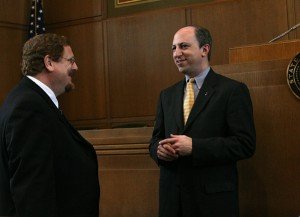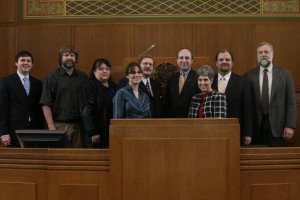
BY VOTE OF 38-21 OREGON’S WORKPLACE RELIGIOUS FREEDOM ACT PASSES IN OREGON’S HOUSE OF REPRESENTATIVES!
Mark it down on your calendar, because this bill effort was a “historic,” if not a heroic, testament of God’s divine providence and power working through human instruments!
May 29, 2009 will long live in the memory of the leadership and support team of the Northwest Religious Liberty Association (NRLA) as Oregon Representative Dave Hunt (D-Gladstone District), the Speaker of Oregon’s House of Representatives, took apart each of the specific arguments of three of his colleagues in his closing remarks during the vigorous debate on the House floor. Opponents argued that current federal law was sufficient, and that the “minimal cost” and administrative “inconvenience” standards to define an “undue” business “hardship” were appropriate for employers to use when denying religious accommodation requests in the workplace.
However, the 65 and 63 percent that voted in favor of the bill in Oregon’s House and Senate chambers respectively, agreed with Speaker Hunt that current law provides employers with little basis for defending the decision to accommodate or to deny accommodation. As a result, they exclaimed that employers often wave the claim of “undue hardship” like a magic wand without having to 1) define, explain, or demonstrate what that “undue hardship” is to the employee, or 2) how it really adversely affects their business in administrative terms, or in dollars and cents. Speaker Hunt, the chief sponsor of SB 786-A, further argued that some employers today continue to regularly define “undue hardship” as anything that causes a business “inconvenience,” and use it as a false legal pretext to refuse, as a matter of policy, to accommodate religious requests.
Speaker Hunt reminded his colleagues that a few unfortunate Supreme Court decisions, beginning with TWA v. Hardison, 432 U.S. 63 (1977), reduced the definition of “undue hardship” to a “de minimis” or “inconvenience” standard in favor of the employer. As a result, it significantly placed people of faith at a disadvantage in the workplace and created unnecessary unemployment hardships for them. That is why “undue hardship,” he argued, must be defined more coherently as a “significant difficulty” and “expense” and that such language, in turn, would also help relieve employers of so many discrimination claims against them.
What This Bill Does
What this bill does is clarify the responsibility of employers to accommodate the scheduling of leave time for the observation of religious holy days, or for the wearing of religious apparel in the workplace unless it poses a “significant difficulty or expense” to their business(es). More specifically, it restores the original federal Title VII legal standard involving religious discrimination which obligated employers to demonstrate that they reasonably attempted to accommodate the sincerely held religious beliefs and practices of their employees before claiming that such beliefs and practices posed a “significant difficulty” and “expense” for their business(es). This bill, once law, will help thousands of people of faith in the workplace who many times are forced to choose between their faith and putting food on the table for their family.
The Next Step
Oregon’s Workplace Religious Freedom Act now goes to the Governor’s desk for his signature. The Northwest Religious Liberty Association, Ecumenical Ministries of Oregon, and the Oregon Jewish Federation of America, have been invited to join House Speaker Dave Hunt and Labor Commissioner Brad Avakian to join him at the signing photo-op with the Governor. This historic event should occur sometime between the middle and end of June.
According to Geoff Sugerman, the Communications Director of Speaker Hunt’s office, “I don’t anticipate that Governor Ted Kulongoski (D) would veto a bill that caters to enhancing and protecting workers’ rights while balancing the rights of employers under Title VII involving religious accommodation and discrimination claims.” Speaker Hunt’s office is fairly certain that Governor Kulongoski will sign the bill into law. But we must not take this last important step for granted. Therefore, please continue to keep this historic legislative Act in your prayers, and specifically pray that the Governor will decide to sign it without reservation.
Divine Providence and An Organizational Note
A few professional observations may be worthwhile.

It has been a tremendous blessing to be a first hand witness to Representative Dave Hunt’s commitment to religious freedom, and particularly in championing religious freedom in the workplace. Speaker Hunt, whose meteoric rise to power and influence as a practicing Baptist in a notoriously liberal state, demonstrated to all discerning observers that he had truly been “called for such a time as this” (see the Scriptural allusion to Esther 4:14).
Indeed, the passage of this bill in both the Oregon Senate (April 9) and House represents nearly eleven years of painstaking lobbying efforts; first with attempts to pass an Oregon Religious Freedom Act affecting the area of constitutional law involving free exercise of religion at the state level (1999-2005), and second with Oregon’s Workplace Religious Freedom Act addressing federal Title VII workplace discrimination law standards and applications at the state level (2007-2009). We failed in the first effort, but succeeded in the second. In a diplomatic sense, battle worn and weary, with anxiety attacks and knots in our stomachs, is one way to describe our experience on Friday, May 29. Sweet resignation and satisfaction, like after successfully climbing to the top of a huge mountain peak, is another that comes to mind.
A number of lessons were learned along the way involving a lot of awkward moments as well as planned, spontaneous and satisfyingly hard earned successes. Learning to be adaptable to political realities and various language compromises, while keeping the overall intent and effectiveness of the bill intact, were the key lessons learned throughout this experience.
On an organizational note, having worked closely with Representative Hunt since 2003 when he was a freshman in the Oregon House of Representatives, and with a bipartisan group of influential Senators since 1999 who directed us to him – including Senator Jason Atkinson (R-Medford District), an aspiring candidate for Governor in 2010 – speaks to what it takes to get a historic bill like this passed.
Building positive working relationships with legislators through an immense amount of meaningful “face time” is the most significant factor. Other terms to describe successful lobbying practices is “on the ground presence” and “real player,” which represents the enormous amount of time, sacrifice, and labor that it takes. In this sense, the entire government relations team of the Northwest Religious Liberty Association (NRLA) has been “called for such a time as this” in the states of Alaska, Idaho, Montana, Oregon and Washington. While we always have improvements to make, our team of Capitol Pastors, attorneys, and administrative advisors, do excellent work and serves as a mighty testament as to why more excellent government relations programs like ours need to be developed in a truly serious and professional way in every state.
A special “thank you” to the entire team who helped us with our efforts is in order. They include 1) Attorney Michael Peabody, who testified with yours truly in a convincing and eloquent manner at the Senate Judiciary Committee hearing; 2) Attorney Steve Green, Law Professor at Willamette College of Law, who was simply brilliant; 3) Oregon Labor Commissioner, Brad Avakian, a powerful advocate in our corner, along with Speaker of the House, Dave Hunt, who testified together with me at the same table at the House Judiciary Committee hearing; 4) David Miller, a faithful Seventh-day Adventist truck driver who testified at the Senate Judiciary Committee hearing; 5) Shani Balverio, a faithful Seventh-day Adventist food service specialist, who also testified at the same hearing; 6) Douglas Clayville, our Capitol Pastor or Representative, who made numerous and much appreciated scheduled “team visits” to legislators with me; and 7) Rhonda Bolton, NRLA’s much appreciated Administrative Assistant, whose coordination and editing services were invaluable when it came to issues of timeliness, coherence, and professional copy appearance of all lobbying materials and official documents.
The Future
With the Oregon Workplace Religious Freedom Act now in place, over the next couple of legislative sessions the Northwest Religious Liberty Association (NRLA) plans to initiate similar legislative bill proposals in each of the other Northwest states. If the United States Congress enacts federal legislation mirroring Oregon’s example, then such a state-by-state effort may be unnecessary.
What the Oregon bill accomplishes is a narrowly tailored model for the federal government to follow in its efforts to see similar protections put forward for people of faith, including religious minorities. If adopted at the federal level, it would promise to help all people of faith and employers in each state of the country.
Last year, when I was in Washington, D.C., making scheduled visits with lawmakers, it was indicated to me by the chief legislative advisor in US Senator Orin Hatch’s (R-Utah) office that both he and Senator John Kerry (D-Massachusetts) were watching closely (and debating over) the legislative effort in Oregon as a model to follow. This is because the Oregon model narrowly addresses religious accommodations involving 1) holy days and 2) the wearing of hazard-free religious apparel or clothing, and not the big “kitchen sink” approach that has often included other specific religious exemptions treating accommodation requests with distinctively moral concerns in the workplace (i.e., the dispensing of the Plan-B pill by Pharmacists and other health care concerns). Political realities, as such, however, caused the Northwest Religious Liberty Association (NRLA) to take a different path, believing that such moral concerns, while important, should be raised in separate bill proposals so as not to year-after-year continually disable, defer, and defeat the narrow but equally worthy need to satisfy the larger purpose of Workplace Religious Freedom Act efforts, both at the state and federal levels, which is to specifically address holy day accommodation requests in the workplace which drives the vast majority of religious discrimination claims.
Some will argue to the contrary, but Oregon’s Workplace Religious Freedom Act is not an unconstitutional “affirmative action” bill for religious minorities and thus a governmental establishment of religion, even though religious minorities are incidentally benefited. [See Estate of Thornton v. Caldor, Inc. (472 U.S. 703) 1985.] The clear intent of the bill is that it will be equally representative of accommodation requests that emanate from all people of faith in two specific areas – holy day and religious apparel accommodation requests. While it may exclude other religious or morally related accommodation requests, particularly in health care related areas, it does not exclude anyone of faith in regard to holy day and religious apparel accommodation requests. While it may incidentally benefit religious minorities in the workplace, the language of the bill is inclusive and directly benefits all people of faith, as well as employers in terms of lowering the number of litigation claims against them, as has been demonstrated in New York since 2006.
Once the Oregon Workplace Religious Freedom Act becomes law, it is bound to face some tough legal challenges in the courts, state and possibly federal. But that is to be expected. Our efforts in providing a more coherent standard for religious accommodation requests on the one hand, and “undue business” standards for employers on the other, was a proactive one and an intelligent step forward.
Thank You!
In conclusion, THANKS SO MUCH FOR YOUR UPLIFTING PRAYERS AND SUPPORT! We could not have done it without you and without God’s guiding hand! Thanks again!
The Northwest Religious Liberty Association, organized in 1906, and reorganized in 1991, serves the states of Alaska, Idaho, Montana, Oregon, and Washington through its team of government relations representatives and attorneys. The Northwest Religious Liberty Association partners with the North American and International Religious Liberty Associations to defend religious freedom here and abroad. Visit the Northwest Religious Liberty Association online at http://www.nrla.com


Congratulations yet again for reaching another milestone. We thank God for your humble efforts. As noted before, NRLA continues to be an inspiration to some of us this side of the ‘pond’ [GREAT BRITAIN AND NORTHERN IRELAND] . Continue to pray for us, as we do the same for you.
Congratulations yet again for reaching another milestone. We thank God for your humble efforts. As noted before, NRLA continues to be an inspiration to some of us this side of the ‘pond’ [GREAT BRITAIN AND NORTHERN IRELAND] . Continue to pray for us, as we do the same for you.
Yet more burden on businesses already having enough trouble staying afloat. Another case of government getting involved in religion. It is wrong, wrong, wrong! If you don’t get some arbitrary day you say is a holy day for you….take a vacation day and stop whining!
Yet more burden on businesses already having enough trouble staying afloat. Another case of government getting involved in religion. It is wrong, wrong, wrong! If you don’t get some arbitrary day you say is a holy day for you….take a vacation day and stop whining!
Ridiculous. I have no problem with people wearing whatever they like to work, such as with the Sikh MTA workers in New York who recently protested the rule that they must put an MTA patch on their turbans. I think they have the right to wear a symbol of their faith and not have to change it to fit the job. But when it comes to wanting additional time off, prayer breaks, or special bath rooms and things like that, I say no way. If you work in a fast food place, let’s say, you can’t just abandon your station all the time. And if you have an office job where you have to answer the phone, it’s unfair to the customers when an employee is constantly leaving. Now, that’s not to say that people can’t do what they want during their designated breaks, the same as smokers or people who need to nurse their babies or whatnot. But you should worship on your own time, not company time.
Ridiculous. I have no problem with people wearing whatever they like to work, such as with the Sikh MTA workers in New York who recently protested the rule that they must put an MTA patch on their turbans. I think they have the right to wear a symbol of their faith and not have to change it to fit the job. But when it comes to wanting additional time off, prayer breaks, or special bath rooms and things like that, I say no way. If you work in a fast food place, let’s say, you can’t just abandon your station all the time. And if you have an office job where you have to answer the phone, it’s unfair to the customers when an employee is constantly leaving. Now, that’s not to say that people can’t do what they want during their designated breaks, the same as smokers or people who need to nurse their babies or whatnot. But you should worship on your own time, not company time.
There’s a stark difference between religious tolerance and religious appeasement. Does this mean atheists and agnostics don’t get any days off, as they don’t have holy days to speak of? They don’t get extra breaks or time off because of their religious affiliation?
There’s a stark difference between religious tolerance and religious appeasement. Does this mean atheists and agnostics don’t get any days off, as they don’t have holy days to speak of? They don’t get extra breaks or time off because of their religious affiliation?
I think it’s important that people are able to practice and express their beliefs freely, and government should protect people’s right to practice their religion, but their should be a clear difference between church and state, and thus the government should not make too many decisions regarding religion. It’s a sticky issue, and it will be interesting to see what happens to this bill going forward in its implementation.
I think it’s important that people are able to practice and express their beliefs freely, and government should protect people’s right to practice their religion, but their should be a clear difference between church and state, and thus the government should not make too many decisions regarding religion. It’s a sticky issue, and it will be interesting to see what happens to this bill going forward in its implementation.
Did anyone try to stand up for the rights of Muslim, Jewish, or Sikh school teachers? Why don’t they have rights too?
Did anyone try to stand up for the rights of Muslim, Jewish, or Sikh school teachers? Why don’t they have rights too?
Building positive working relationships with legislators is one the most significant factors but I’m not convinced this will happen. It will be interesting to see what happens next in this mandate.
Alexa Rae – Manufactured Homes in Oregon